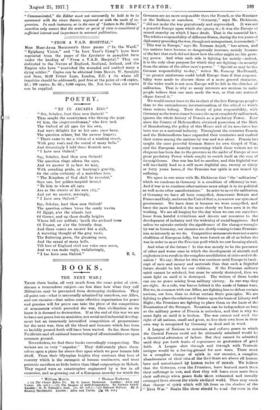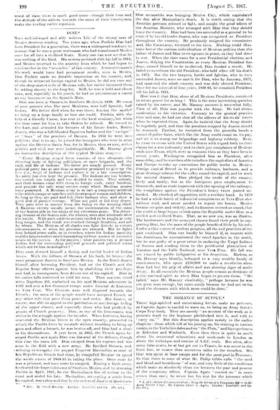BOOKS.
THE NEXT WAR.: THESE three books, all very much from the name point of view, discuss a tremendous subject—no less Mum how what they call Militarism may be prevented from destroying civilization. They nil point out—what is universally admitted by ourselves, our Allies, and our enemies—that unless some effective organization for peace and genuine will for peace can take the place of the competition of armament+ which preceded the war, then civilization as we know it is doomed to destruction. If at the end of this war we are to have not peace but an armistice, not social and industrial develop- ment but an immensely intensified competition of preparations for the next war, then all the blood and treasure which has been no lavishly poured forth will have been wasted. So far, these three Pacifieistas and all rational human beings of all nationalities arc upon common ground.
Nevertheless, we fad these books exceedingly exasperating. The writers are no very " superior." They deliberately place them- selves upon a plane far above that upon which we poor Inman folk dwell. From their Olympian heights they contemn that love of country which is the strongest of human sentiments, and treat patriotic sacrifices as little better than blind outpourings to Moloch. They regard wars as catastrophes engineered by a few in all countries, and as growing out of a European anarchy for which the
• William Morris. t Thomas Trahorno. I (I) The Choice Before Vs. Dy G. Locos Dickinson. London Allen and Pieria. Ito. nct.)-(2) The Pomo. ail Balf-Preparednese. Hy Norman London:- G. P. Putaam'a goon. (2a. out.)-(a)Nolnoosi De.f.. . MY 3. Ramsay MacDonald. London Waco and gunk. Ots. ed. Intl - Germane are no more responsible titan the French, or the Russians or the Italians, or ourselves. " Germany," says Mr. Dickinson, " did not make the war gratuitously and unprovoked. It was not a peaceful Europe upon which she sprang it ; it wan the Europe of armed anarchy on which I have dwelt. That is the essential fact. The relative responsibility of different States, during the ten years of diplomacy preceding the war, though not unimportant, is secondary." " This war in Europe," says Mr. Norman Angell, " has arisen, and the nations have become so dangerously insecure, mainly because of the fact that each did not know how the other might sin, his grow- ing power. And what each side is fighting for mainly—indeed, it is the only clear purpose for which they are fighting—is security from the abuse of the other mon's power." Special as may lie the German responsibility to-day," writes Mr. Ramsay MacDonald, " no greater misfortune could befall Europe than if that responsi- bility were made to obscure those of a more general character. If the wider truth is not seen Europe will be loft in the clutches of militarism. That is why so many interests are anxious to make people believe that one man made the war, or that one national clique forced it."
We would sooner trust to the instinct of the free European peoples than to the cantankerous internationalism of the artiest to which these writers belong. Their theory of joint responsibility, with Germany as the worst sinner because the most completely militarized, ignores the whole history of Prussia as a predatory Power. Ever since the Counts of Hohenzollern obtained possession of the Mark of Brandenburg, the policy of this House and of its associates has been war as a national industry. Throughout the centuries Prussia and the Hohenzollerns have expanded their territories and exalted their status among the nations by war and war alone. Prussia has taught the once peaceful German States its own Gospel of War, and the European anarchy concerning which these writers are on eloquent has been duo to the presence in the midst of Europe of one great predatory Power which sought to enrich itself at the cost of its neighbours. One war has led to another, and this frightful war will inevitably lead to a still more frightful one, twenty or thirty or forty years hence, if the Prussian war spirit is not tamed by suffering.
We agree in one sense with Mr. Dickinson that " the ' militarism' which we condemn in Germany is a condition of efficiency in war. And if war is to continueother nations must adopt it in its political as well as its other manifestations." In order to meet the militarism of Germany we have all been compelled, democratic Britain and France and Italy, and even the United States, to narrow our system of government. Wo have done it because we were compelled, and have the more loathed it the more closely we have aeon it in the working. We are all longing for the day when we can cut ourselves loose from hateful restrictions and devote our resources to the development of industry and the widening of social happiness. And unless we mistake entirely the significance of the changes wrought by war in Germany, our enemies are slowly coming to hate Prussian- ism as intensely as we do. Competitive armaments were nom mere ebullition of European folly, but were forced on all of us before the war in order to meet the Prussian peril which we saw looming ahead.
And what of the future ? Is this war merely to be the precursor of other and worse ones in which the development of aircraft and explosives is to result in the complete annihilation of cities and civili- zation t We eay: Better let this war continue until Europe is bank- rupt of men and money and materials than that such a frightful future should lie left for our children. If the Prussian military spirit cannot be subdued, but must be utterly destroyed, then we must fight on until it is destroyed. The writers of these books can see no peace arising from military victory. In one way they are right. As a rule, war leaves behind it the seeds of future wars. But we, in common with our Allies, are fighting less to defeat certain nations, our foes, than to defeat certain State principles. We are fighting to place therelations of Sates upon the basis of Liberty and Right; the Prussians are fighting to place them on the basis of the Domination of the Stronger. No nation can be independent so long as the military power of Prussia is unbroken, and that is why we must fight on until it is broken. The war cannot end until the right of all nations, small and great, to live their own lives in their own way is recognized by Germany in deed and in word.
A League of Nations to maintain and enforce peace to which the Central Powers could not be ultimately admitted would be a theoretical admission of failure. But they cannot be admitted until they put forth fruits of repentance as guarantees of .gool faith. A League shot through and through with Teutonic intrigue would bo a forcing-ground for new wars. There must be a complete change of spirit in our enemies, a complete abandonment of their idea of the God-State set above all human laws and unrestrained by human codes of morale. We believe that the Germans, oven the Prussians, have learned much from their sufferings in wile, and that they will learn even more from their sufferings when peace finds them exhauated and morally estranged from almost the whole civilized world. Then may come that change of spirit which will lift from us tile shadow of the " Next War.' Books like these should be read —for eVenlis the



























 Previous page
Previous page